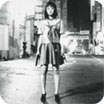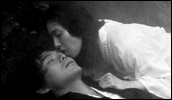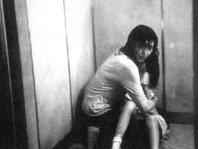Dark Wave 2002
Feature article by Jeff Vorndam
![]() n
its fourth year, Dark Wave is a series of international horror and cult films
sponsored by the San
Francisco Film Society. I managed to catch four of the titles this year
and emerged unscathed.
n
its fourth year, Dark Wave is a series of international horror and cult films
sponsored by the San
Francisco Film Society. I managed to catch four of the titles this year
and emerged unscathed.
 Only
one of the four, Teenage
Hooker Became Killing Machine in DaeHakRoh, is what I would classify
as "extreme cinema" (the slogan for the series), and coincidentally, it was
the only one of the four I disliked. In case you can't tell from the title,
it's one of those midnight movies that sometimes attracts a cult following due
its bizarreness, extreme violence, and/or graphic sex. I'm not a person who
blanches at gore or explicit sexual content, but neither am I someone who gets
excited at the mere presence of severed limbs and vaginas that shoot bullets.
If all a movie has going for it is its audacity it isn't much of a movie.
Only
one of the four, Teenage
Hooker Became Killing Machine in DaeHakRoh, is what I would classify
as "extreme cinema" (the slogan for the series), and coincidentally, it was
the only one of the four I disliked. In case you can't tell from the title,
it's one of those midnight movies that sometimes attracts a cult following due
its bizarreness, extreme violence, and/or graphic sex. I'm not a person who
blanches at gore or explicit sexual content, but neither am I someone who gets
excited at the mere presence of severed limbs and vaginas that shoot bullets.
If all a movie has going for it is its audacity it isn't much of a movie.
|
Teenage Hooker Became Killing
Machine in DaeHakRoh Korean language. South Korea, 2000.
60 minutes. Inugami Japanese language. Japan, 2001.
106 minutes. Dark Water Japanese language. Japan, 2002.
101 minutes. Intacto |
Thankfully, director Gee-woong Nam, in addition to the wayward limbs and the trigger-happy vaginas, boldly experiments with framing and color, and even if it doesn't all make sense, it is original. Teenage Hooker is shot on digital video, but it doesn't settle for the mediocre washed-out look that plagues most of this year's indie crop (Tadpole and The Good Girl). Nam (who also serves as writer and cinematographer) bathes the screen in reds, greens and blues, occasionally melding them into new colors. The red-light district truly is the red-light district in this film. The garishness of the colors and the distortion provided through the camera's leering lens, give the film a rancid-funhouse feel.
The story, such as it is, concerns a teenage prostitute who runs into her high school teacher one night. This dude is some piece of work:. Always giggling maniacally, the teacher performs this kooky dance (you have to see it to believe it) that involves some disturbing hip action that apparently hypnotizes the schoolgirl. Next thing she knows, she's being cut up open and turned into a killing machine. Remember those fem-bots in Austin Powers? It's kind of like that, only more naked and with more blood. I suppose there might be some buried social commentary here (the education system in Japan produces homicidal robots?), but it takes a back seat to lurid sensation. In print, this sounds a lot cooler than it actually is, but Teenage Hooker isn't all that titillating. Despite its bare-bones plot, it's not easy to follow. Mercifully, it clocks in at about an hour.
 Another
film that had me going WTF? every few minutes was Masato Harada's Inugami.
It is set in the present in a remote area of Japan where modernity isn't just
resisted but repelled by unseen demons. It's a horror movie that isn't scary,
and though a supernatural element is present, it's never shown, causing all
of the bad things that happen to look like the doings of some deranged cult.
Inugami is about a family that lives an isolated, Quaker-like existence
with strict adherence to traditional values (but not entirely strict, as one
of the men bends the rules whenever he sees fit). The women have a curse--they
must watch over an urn containing the Inugami--wolf-like demons that, if unleashed,
create calamity in the village. When an outsider comes to the village and falls
in love with one of the women, she must choose between him and the Inugami.
The other members of the family take drastic measures to stop her.
Another
film that had me going WTF? every few minutes was Masato Harada's Inugami.
It is set in the present in a remote area of Japan where modernity isn't just
resisted but repelled by unseen demons. It's a horror movie that isn't scary,
and though a supernatural element is present, it's never shown, causing all
of the bad things that happen to look like the doings of some deranged cult.
Inugami is about a family that lives an isolated, Quaker-like existence
with strict adherence to traditional values (but not entirely strict, as one
of the men bends the rules whenever he sees fit). The women have a curse--they
must watch over an urn containing the Inugami--wolf-like demons that, if unleashed,
create calamity in the village. When an outsider comes to the village and falls
in love with one of the women, she must choose between him and the Inugami.
The other members of the family take drastic measures to stop her.
It's slow moving, yet still hard to follow. The Inugami seem to be a projection of the malaise that infests the family. In this respect, the film is similar to A Chronicle of Corpses. Both films feature families suffering from alcoholism, incest, and general stagnancy. But where the evil force in Corpses attacks the family, the Inugami spread their wrath upon the villagers who live nearby, causing mysterious deaths and bad luck. It is difficult to be roused by any of the action, since it's not clear how the Inugami are unleashed, and what exactly they do (most of the mayhem occurs off-screen). The cinematography is excellent though, and the black-and-white climax is worth sitting up for.
 Dark
Water, the latest from Ring-auteur Hideo Nakata, had me sitting
up straight all the way through. Its story and setting are more mundane than
the novel Ring, a film whose premise is enough to make your neck hairs
dance. It takes place largely in a shabby apartment complex, and the scares
involve everyday objects like a purse that reappears each time it is thrown
away, and a leaky ceiling that forebodes of a sinister presence in the apartment
above. A recently divorced mother and her young daughter have moved into the
complex. The mother is trying to establish herself as a good parent in the eyes
of the court, but after her divorce, she finds herself looking for a job to
support her daughter. Her responsibilities sometimes overwhelm her, and she
occasionally forgets to pick her daughter up at school, which doesn't sit well
with the court or-- her ex-husband. When strange shit starts happening at her
apartment (like seeing a little girl in the flooded, and supposedly vacant,
unit one floor up), she starts to believe her ex-husband is plotting against
her, trying to make her crazy so she'll be forced to give up her daughter.
Dark
Water, the latest from Ring-auteur Hideo Nakata, had me sitting
up straight all the way through. Its story and setting are more mundane than
the novel Ring, a film whose premise is enough to make your neck hairs
dance. It takes place largely in a shabby apartment complex, and the scares
involve everyday objects like a purse that reappears each time it is thrown
away, and a leaky ceiling that forebodes of a sinister presence in the apartment
above. A recently divorced mother and her young daughter have moved into the
complex. The mother is trying to establish herself as a good parent in the eyes
of the court, but after her divorce, she finds herself looking for a job to
support her daughter. Her responsibilities sometimes overwhelm her, and she
occasionally forgets to pick her daughter up at school, which doesn't sit well
with the court or-- her ex-husband. When strange shit starts happening at her
apartment (like seeing a little girl in the flooded, and supposedly vacant,
unit one floor up), she starts to believe her ex-husband is plotting against
her, trying to make her crazy so she'll be forced to give up her daughter.
Little incidents pile up, and eventually what was strange becomes terrifying. Dark Water is an atmospheric and psychological horror film. It relies on sound (and a smart use of silence) and photography (the apartment complex is pallid green, with a phantasmagoric aura) to convey dread, as opposed to imminent physical danger and sudden 'fake' scares that turn out to be nothing. The psychology is revealed by the explanation for the weird occurrences, which I won't go into here, except to say that I wonder if Nakata were abandoned in a shopping mall as a child, for both Ring and Dark Water are borne of the child's fear of being left alone.
Saving the best for last, Intacto promises to be the next Memento, an ingeniously conceived thriller that is more melancholy than it might seem at first glance. Because your mouse doesn't have anything better to do, click here for my full review.
Though I wouldn't call Dark Wave 2002 a festival of extreme cinema, it does show that, lurking in the margins and shadows, creativity is thriving. Shine a light under the rock of your local movie scene, and see what that squirming is. It's probably Dark Wave.
Grade Summary:
Teenage Hooker Became Killing Machine in DaeHakRoh: C-
Inugami: C+
Dark Water: B-
Intacto: B
Feature and interviews
© November 2002 by AboutFilm.Com and the author.
Images © each picture's respective distributor. All Rights Reserved.
| Related Materials: | ||
| |
||
| |
||
| |
||
| |
||
| |
||
| |
||
| |
||
| IMDB pages linked in body of article, above |